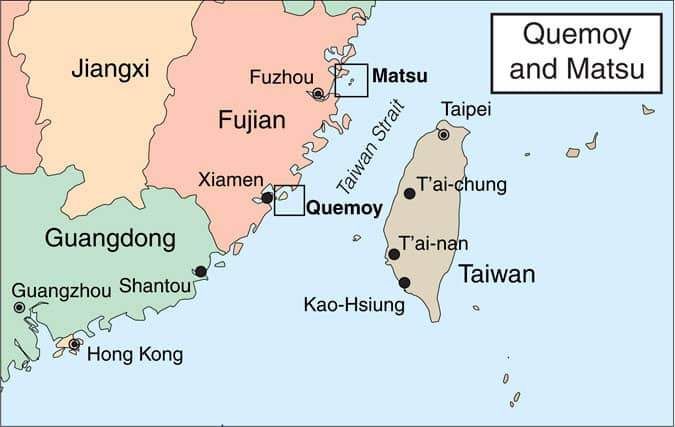Are Taiwan's Islands of Quemoy and Matsu China's Next Target? By Joy Votrobek
Friday, December 4, 2020
Categories: ASCF News Emerging Threats National Preparedness ASCF Articles

By Joy Votrobek, Sr. Research Analyst, ASCF
The Communist People's Republic of China (PRC) has been determined to reunify Taiwan with mainland China since 1949 when Mao Tse-tung successfully unified China under Communist rule. The defeated Chiang Kai-shek and his Kuomingtang (KMT) Nationalists retreated to present-day Taiwan and the islands Quemoy and Matsu. Both the PRC and the Nationalists considered themselves the true rulers of a "One China" policy. In 1954, the KMT insisted on the liberation of mainland China which prompted the PRC's military to begin an artillery assault on Taiwan's islands of Quemoy and Matsu. The two islands are within eight miles of mainland China. In December of 1954, Taiwan signed a Mutual Defense Treaty with the U.S. The Treaty pledged the U.S. to defend Taiwan as well as other territories, determined by mutual agreement of both parties. In 1955, President Eisenhower made it clear that the U.S. was ready to use nuclear weapons to stop an assault by the PRC. Shortly after Eisenhower's statement, the PRC negotiated with Taiwan and the assault on Quemoy and Matsu ceased.
In 1979, Congress passed into law the Taiwan Relations Act in response to President Jimmy Carter's severing diplomatic ties with Taiwan in favor of the Communist PRC. The Act maintains Carter's recognition of diplomatic relations with the PRC with the understanding the PRC is to keep a peaceful future with Taiwan. The Act allows the U.S. to use force against the PRC's military if Taiwan's security is in jeopardy. But the wording is ambiguous enough that we should not assume the U.S. would protect all the Taiwanese islands of Quemoy and Matsu. Action against the PRC is left to the President and Congress to determine appropriate action according to the 1979 Act. New legislation was introduced to Congress by Senator Rick Scott on September 17th, 2020, titled "Taiwan Invasion Prevention Act" (TIPA). TIPA would update the 1979 Taiwan Relations Act to bring attention to the PRC's increased military capability and intensified pressure around the Taiwan Straits. The revised Act allows for a U.S. military response to "the taking of territory under the effective jurisdiction of Taiwan by the military forces of the People's Republic of China." If TIPA became law, there would be less ambiguity on the U.S. military protecting Quemoy and Matsu from a PRC attack.
The PRC's President Xi Jinping has a renewed determination of the "One China" policy since Taiwan's presidential election of Tsai Ing-wen in 2016. President Tsai openly opposes reunification with mainland China. After China's crackdown on semi-autonomous Hong Kong, the Taiwanese wondered if they would be next, helping to secure President Tsai's re-election landslide in January of 2020.
Even with President Xi's "One China" determination, China would have to question its losses in an all-out war with Taiwan since the U.S. has been equipping and training the Taiwanese military. Instead of attacking Taiwan's main island, the PRC's military could be setting their sights on Quemoy and Matsu. That would have a more immediate impact without as much risk since the islands are only eight miles off mainland China. It would also make it more difficult for a U.S. retaliation. The U.S. and its allies maintain a naval presence through the Taiwan Straits as a show of "Peace through Strength." But, what if the naval presence is not enough? Does the U.S. have the military strength and will to deter China from using force against Taiwan's islands of Quemoy and Matsu? If the U.S. allows China to use force on the islands, will the U.S. defend Taiwan's main island? The United States reaction to force against the islands of Quemoy and Matsu will also send a signal to other Asian countries and the world of the United States' willingness to defend other outlying islands from the PRC's military.











